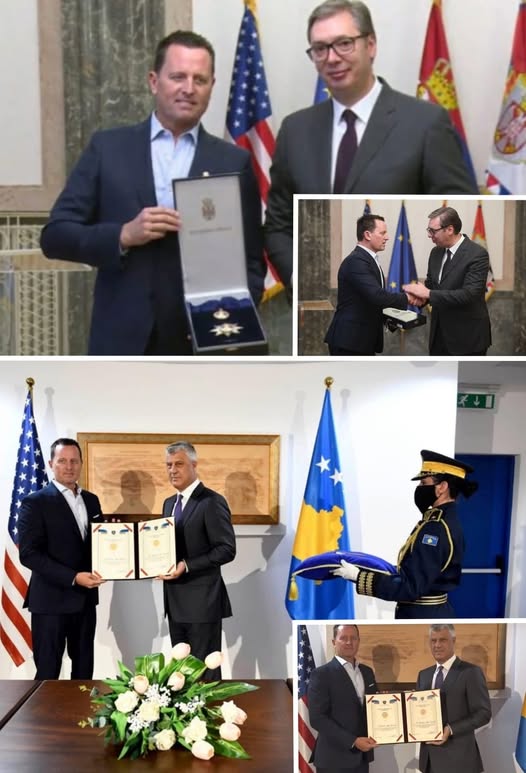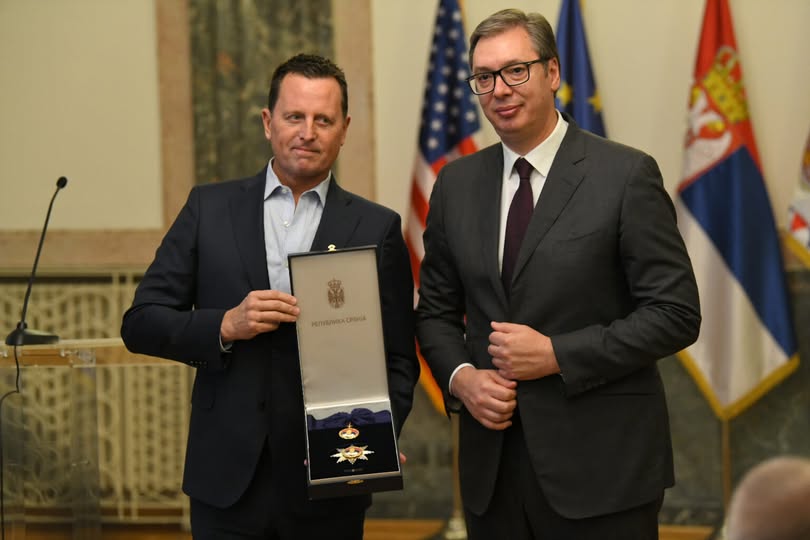Explore the Unseen with The Gunpowder Chronicles: Insights from the Frontlines
Thank you for reading this post, don't forget to subscribe!Grenell is no ambassador, he’s a discarded operative, repackaged by Behrami to deceive a nation and resurrect a disinformation war against Kosovo’s justice system.
May – 16 2025
In a region where politics is often performed in 280-character bursts and diplomatic façades are curated on social media, a single word can alter perceptions, obscure truths, and manipulate reality. When Artan Behrami, a former journalist and political operative linked to Hashim Thaçi’s inner circle, declared he had met with “Ambassador Richard Grenell,”¹ he was not merely sharing a pleasantry or echoing outdated protocol. He was engaging in an intentional act of misdirection, one with serious implications for Kosovo’s fragile democracy.
Richard Grenell is not an ambassador: He has not held any official diplomatic title since (forced) resigning in 2020 as U.S. Ambassador to Germany, following intense pressure from Berlin and open calls for his expulsion². Nor does he have any formal role within the current or former U.S. administration related to Kosovo, Serbia, or the Balkans at large. Yet, in Behrami’s tweet “Great meeting with Ambassador @RichardGrenell — a steadfast supporter of #Kosovo and a staunch advocate for truth and justice” — the falsehood is slipped in as fact, feeding a dangerous narrative in which disinformation actors are recast as legitimate envoys.
Artan Behrami falsely elevates Richard Grenell as “Ambassador” and a champion of Kosovo, despite Grenell’s discredited record, revoked clearance, and history of destabilising interventions (A Behrami’s X Post).
The use of the title “Ambassador” is not only factually inaccurate, it is politically loaded. It is designed to lend credibility to a figure who, in reality, has become increasingly marginalised in Washington policy circles and whose interventions in Balkan affairs have drawn widespread condemnation from European diplomats, U.S. security officials, and international observers alike.
Grenell: No Ally of Kosovo, No Advocate for Truth
The claim that Richard Grenell is a “steadfast supporter of Kosovo and a staunch advocate for truth and justice,” as Artan Behrami asserts, collapses under even minimal scrutiny. Grenell’s track record in the region is not one of support, but subversion, defined by political manipulation, media disinformation, and alliances with authoritarian and criminal networks that actively undermine Kosovo’s sovereignty. Far from advocating truth, Grenell was a central figure in orchestrating the 2020 collapse of Albin Kurti’s government through a campaign rooted in falsehoods, including the strategic dissemination of misleading statements about U.S. troop withdrawal via tweets by Donald Trump Jr. and Senator David Perdue, tactics explicitly condemned in the European Parliament’s 2021 report on disinformation in the Western Balkans.
He is no advocate of justice, either: Grenell’s record includes attempts to sabotage the Kosovo Specialist Chambers, a court set up to deliver justice for war crimes and political assassinations, the very crimes many of his political allies are now charged with. His close coordination with figures like Berat Buzhala, who openly spreads fabricated electoral narratives, and his amplification of such disinformation during the 2025 election cycle, reveal a continued intent to distort democratic processes rather than uphold them. Furthermore, Grenell’s undeclared financial relationships with sanctioned oligarchs such as Vladimir Plahotniuc, a known destabiliser of pro-Western institutions, along with his work for Hungarian state-affiliated actors seeking to manipulate U.S. policy, make clear that his loyalties lie not with Kosovo’s independence or democratic integrity, but with geopolitical opportunism such as the one coming from Moscow. In short, Grenell has consistently acted as a destabilising agent, leveraging Kosovo’s vulnerability for personal and ideological gain. Labelling him as a friend of Kosovo or a defender of justice is not only dishonest, it is an insult to those genuinely working to uphold the rule of law in one of Europe’s most fragile democracies.
A Diplomatic Has-Been in Search of a Stage
Grenell’s name still echoes in the Balkans, but not because of diplomatic virtue. His legacy includes the widely condemned effort to orchestrate the collapse of Kosovo’s government in 2020, a manoeuvre dissected in a European Parliament report on disinformation in the Western Balkans. According to the report, Grenell played a central role in the toppling of Prime Minister Albin Kurti’s administration by exploiting fabricated crises, including a coordinated messaging campaign involving Donald Trump Jr. and U.S. senators threatening to withdraw troops from Kosovo. The disinformation was aimed at destabilising Kurti’s government for refusing to agree to a rushed and opaque deal with Serbia, a deal widely perceived to favour U.S. electoral optics over Kosovo’s sovereignty.
Five years later, Grenell’s methods appear unchanged. This February, he returned to his preferred platform, X³ accusing Kurti of destabilising the region and falsely claiming the international community had turned against Kosovo’s government. These comments were amplified by local media operatives such as Berat Buzhala, whose leaked WhatsApp messages revealed direct coordination with Grenell in pushing electoral disinformation. The goal was clear: delegitimise Kosovo’s democratic process and bolster pro-Serb narratives in the run-up to the February 9 elections.
What has changed, however, is Grenell’s standing in the halls of Washington.
The Trump Snub: A Fall from Grace
Recent reporting from The Gunpowder Chronicles reveals just how far Grenell has fallen from influence in U.S. foreign policy circles. In a botched effort to orchestrate a meeting between Serbian President Aleksandar Vucic and Donald Trump during a visit to Florida, Grenell was reportedly instrumental in trying to facilitate a photo-op that would cast Vucic as a statesman still welcomed in Washington.
But Trump, informed by members of his inner circle and briefed on troubling intelligence, rebuffed the meeting entirely⁴. Vucic abruptly ended his U.S. visit, citing “illness” — a diplomatic euphemism for rejection. According to sources, the rejection stemmed not only from Vucic’s declining value to Trump world, due in part to mounting anti-Trump sentiment in Serbia, but also from intelligence indicating Vucic was no longer viewed as a reliable geopolitical partner.
Grenell’s failure to secure the meeting underlines his diminished role. Once a prominent figure during Trump’s first term, Grenell now occupies the fringes of political relevance, assigned earlier this year to a culture war post: director of the Kennedy Center. His mandate? To “root out anti-American propaganda,” targeting drag shows and progressive art, a far cry from statecraft in the Balkans.
A Web of Disinformation
Behrami’s endorsement of Grenell must be read within the broader context of a disinformation campaign designed to erode the rule of law in Kosovo. Behrami himself has spent the past year attacking the Kosovo Specialist Chambers (KSC) in The Hague, which is currently prosecuting Hashim Thaçi for war crimes. On Facebook⁵, Behrami has accused the court of cruelty, conspiracy, and Western hypocrisy. In leaked video footage, he is even seen telling supporters that dismantling the KSC requires first removing Kurti from power.
This aligns with findings by The Gunpowder Chronicles⁶, which has documented the involvement of Behrami, Grenell, Buzhala, and others in a coordinated effort to undermine Kosovo’s judicial institutions. The campaign involves disinformation, witness intimidation, and media manipulation. Grenell, though officially irrelevant, remains symbolically useful to this network. By portraying him as an “ambassador,” Behrami and others inflate Grenell’s status and feed a false perception of international consensus against Kurti’s administration.
But the illusion is cracking. Grenell’s security clearance was reportedly revoked in 2023, a consequence of his undisclosed financial ties to Russian-backed operatives such as Moldovan oligarch Vladimir Plahotniuc and contracts with the Hungarian government via the Magyar Foundation. Investigative reporting by ProPublica⁷, The Washington Post⁸, and Der Spiegel⁹ revealed that Grenell failed to register his foreign lobbying work under FARA, the same law that brought down Paul Manafort.
His former hosts in Berlin, too, have not forgotten. German lawmakers once publicly demanded his expulsion¹⁰, and German intelligence agencies concluded that he had established contact with the far-right Alternative für Deutschland (AfD), a party with ties to both Moscow and Beijing now outsted by Germany’s elections system¹¹. His departure from Germany in 2020 was framed as a resignation¹², but to most observers, it was a forced retreat.
Narrative Warfare, Not Diplomacy
Behrami’s social media post should not be dismissed as a slip of the tongue or a diplomatic courtesy. It is a deliberate act of narrative manipulation, the kind that has characterised Grenell’s and Thaçi’s shared political project: reframe criminals as heroes, journalists as enemies, and propagandists as ambassadors.
In Kosovo, where the media ecosystem remains vulnerable to external interference and internal co-optation, such manipulations have real consequences. They shape public perceptions, sway voters, and undermine faith in institutions. They also reveal how actors like Grenell, despite being stripped of their formal power, can still wreak havoc through narrative warfare.
Kosovo’s future hinges not only on resisting foreign interference but also on resisting the repackaging of discredited figures as voices of authority. In the case of Grenell, the record is clear: he is no ambassador. He is a political operative, stripped of clearance, rejected by Washington, and serving interests far removed from the values of democracy and justice that Behrami falsely claims he defends.
In an age when propaganda travels faster than truth, naming matters. And so does the courage to correct it.


Shënim:
Redaksia, diplomacia. dk nuk e merr përgjegjësinë për pikëpamjet e autorit në shkrimin e botuar!
Respekt!
